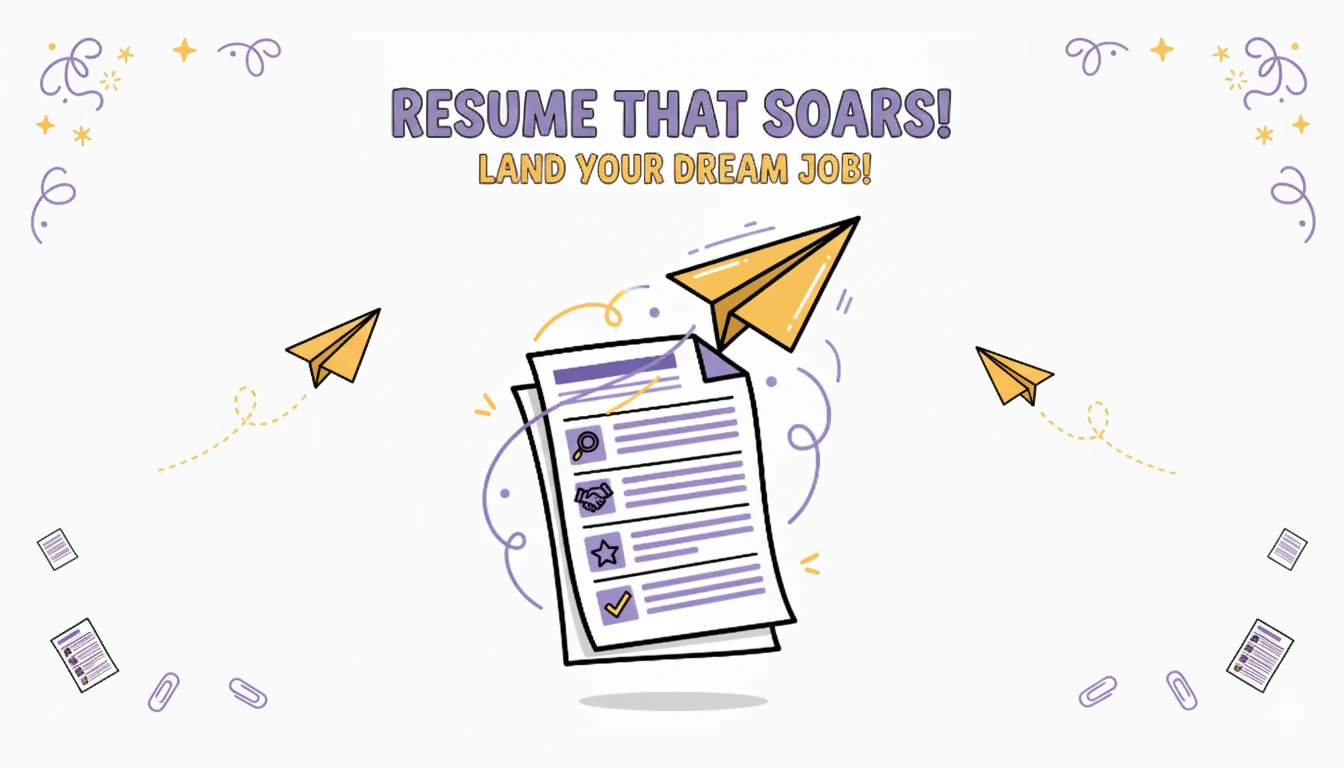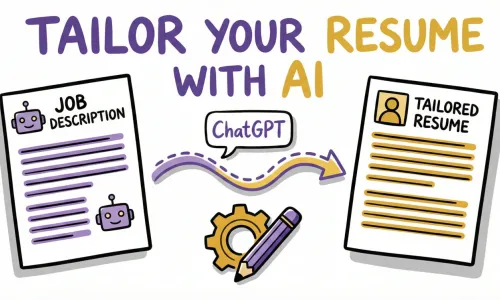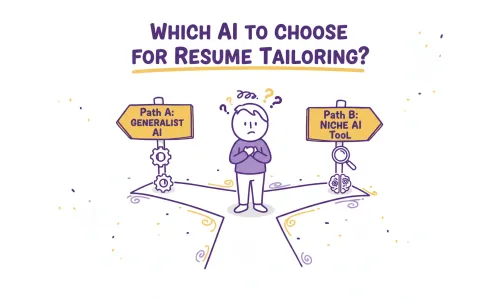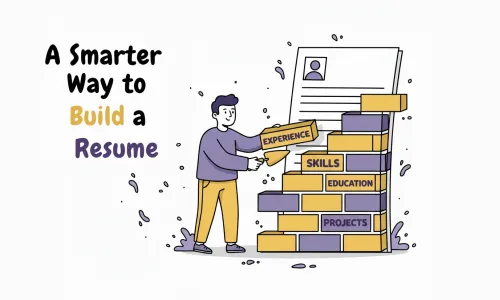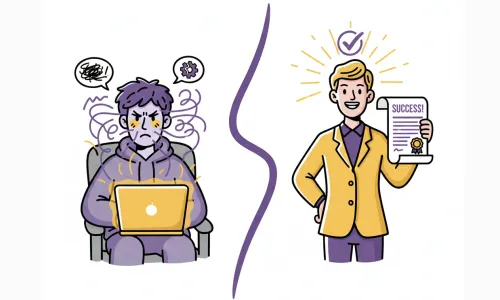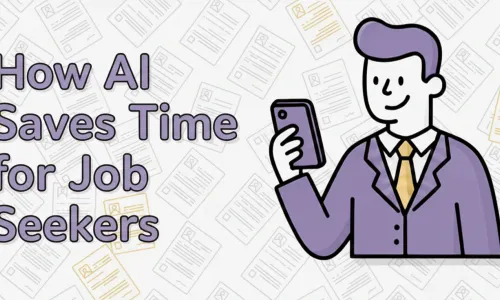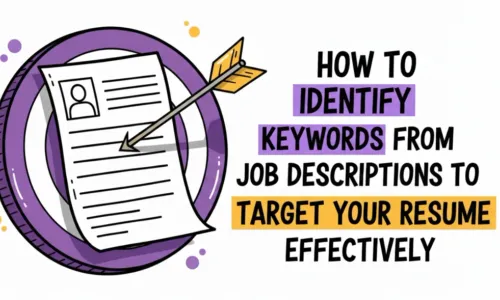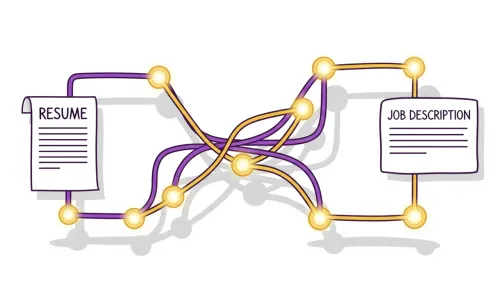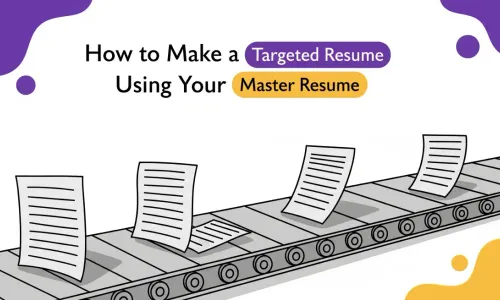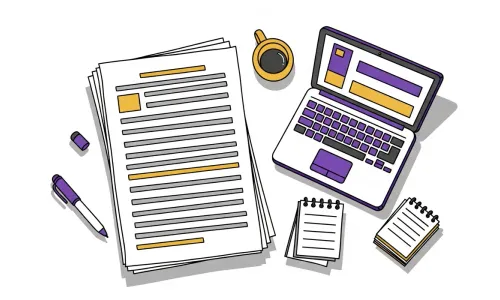Over 75% of resumes are rejected by an Applicant Tracking System (ATS) before they ever reach a human. A targeted resume is your best defense against the bots. It is a resume that has been customized to highlight the skills and experience you have that are most relevant to a specific job description. Instead of sending the same generic document to every employer, you adapt your resume to each application, ensuring that it speaks directly to the needs of the hiring manager.
In today's job market, a tailored resume is not just an option; it's a necessity. These systems are programmed to scan for specific keywords and qualifications, and a generic resume is likely to be filtered out before it has a chance to be seen. By tailoring your resume, you are not only optimizing it for the ATS but also showing the employer that you have taken the time to understand their needs and that you are a strong fit for the role. It's a powerful way to make a great first impression and significantly increase your chances of landing an interview.
In this guide, we'll break down the five most important sections of your resume to customize for each job application, ensuring you make it past the initial screening and into the hands of a hiring manager. For a deeper dive into the specifics of AI resume tailoring, check out our post on AI resume tailoring.
Section 1: The Professional Summary – Your 6-Second Pitch
Your professional summary is your elevator pitch. It's a brief, 3-4 sentence paragraph at the top of your resume that should grab the reader's attention and compel them to learn more about you. A well-crafted summary can be the difference between your resume being read or being tossed aside.
Before: The Generic Summary
"A highly motivated and results-oriented professional with a proven track record of success. Seeking a challenging role in a fast-paced environment where I can utilize my skills and experience to contribute to the success of the company."
This summary is full of clichés and tells the hiring manager nothing specific about the candidate's qualifications.
After: The Targeted Summary
Now, let's look at a summary targeted for a "Senior Marketing Manager" role that requires experience in SEO, content marketing, and team leadership:
"A data-driven Senior Marketing Manager with over 8 years of experience developing and executing successful SEO and content marketing strategies that have resulted in a 200% increase in organic traffic and a 35% growth in marketing qualified leads. A proven leader with a passion for building and mentoring high-performing teams."
This summary is specific, quantifiable, and directly addresses the requirements of the job description.
How to Write a Targeted Professional Summary
- Start with your job title and years of experience. This immediately tells the hiring manager that you have the relevant experience.
- Highlight 2-3 of your most impressive and relevant achievements. Whenever possible, quantify your achievements with numbers and data.
- Incorporate keywords from the job description. This will help you get past the ATS and show the hiring manager that you are a good fit.
- Mention your most relevant skills. This is another opportunity to incorporate keywords and showcase your qualifications.
Section 2: The Skills Section – Aligning with Job Requirements
Your skills section is a critical component of your targeted resume. It provides a quick and easy way for hiring managers and the ATS to identify your qualifications. A well-organized and targeted skills section can make a significant impact on your job search success.
Hard Skills vs. Soft Skills
It's important to include a mix of both hard and soft skills in your resume.
- Hard skills are specific, teachable abilities that can be measured, such as proficiency in a programming language or experience with a particular software.
- Soft skills are interpersonal skills that relate to how you work and interact with others, such as communication, teamwork, and problem-solving.
How to Extract Keywords from the Job Description
A simple yet effective method for identifying keywords is to copy and paste the job description into a word cloud generator. The most frequently used words will appear larger, giving you a good indication of the most important keywords to include in your resume. You can also manually scan the job description for words and phrases that appear multiple times.
Example of a Targeted Skills Section
Let's say you're applying for a Project Manager position that requires experience with Agile methodologies, Scrum, and JIRA.
Before: The Generic Skills Section
- Skills: Project Management, Microsoft Office, Communication, Teamwork
After: The Targeted Skills Section
- Project Management: Agile, Scrum, JIRA, Risk Management, Budgeting
- Software: Microsoft Project, Asana, Trello
- Languages: English (Native), Spanish (Conversational)
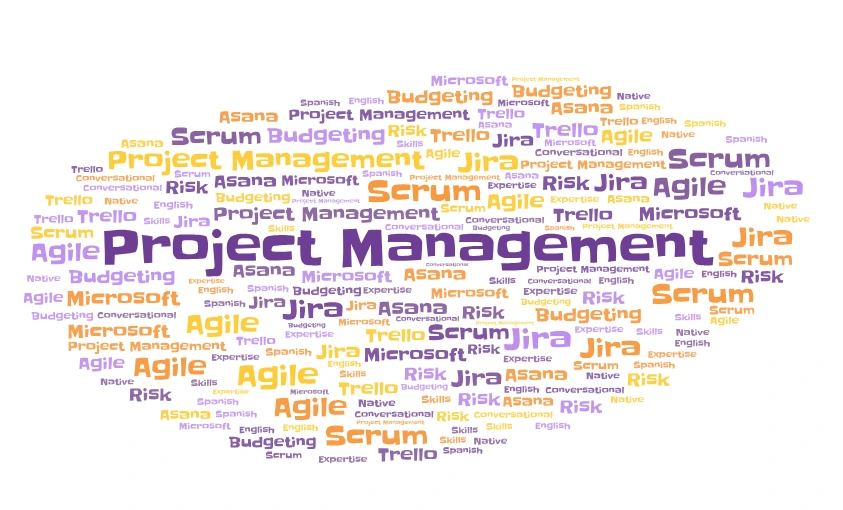
Section 3: The Work Experience Section – Showcasing Relevant Achievements
Your work experience section is the heart of your resume. It's where you provide concrete evidence of your skills and accomplishments. To create a targeted resume, you need to go beyond simply listing your job duties and instead focus on showcasing your most relevant achievements.
From Duties to Accomplishments
Instead of thinking about what you did in your previous roles, think about what you achieved. A duty is a task you were assigned, while an accomplishment is a result you delivered. For example, instead of saying "Managed social media accounts," you could say "Grew social media following by 50% in 6 months."
Quantifying Your Achievements
Whenever possible, use numbers and data to quantify your achievements. This makes your accomplishments more tangible and impressive to hiring managers. Remember to only use metrics that are measurable and make sense in the context of your role. For example, instead of saying "Improved sales," you could say "Increased sales by 15% in the first quarter."
Tailoring Your Bullet Points
For each job application, review the job description and identify the key requirements and responsibilities. Then, tailor the bullet points in your work experience section to highlight the achievements that are most relevant to that specific role. This may mean reordering your bullet points, rewriting them to include specific keywords, or even removing achievements that are not relevant to the job.
Section 4: Keywords and Job Title - Beating the ATS
To get your resume past the Applicant Tracking System (ATS), you need to think like a machine. ATS software is designed to scan your resume for specific keywords and phrases that match the job description. This section will delve into the more technical aspects of resume tailoring to ensure your resume makes it to a human reader.
How to identify and integrate keywords
While we touched on this in the skills section, it's crucial to sprinkle relevant keywords throughout your entire resume, including your professional summary and work experience section. A good strategy is to create a list of keywords from the job description and then find natural ways to incorporate them into your resume. Don't just stuff your resume with keywords; they should be used in a way that makes sense and adds value to your content.
The importance of job title alignment
Many companies use the job title as a primary screening factor. If the job title on your resume doesn't match the one you're applying for, you could be automatically disqualified. If your current job title is different from the industry standard, consider using a more common title on your resume. For example, if your title is "Customer Happiness Hero," you might want to change it to "Customer Service Representative" to ensure the ATS recognizes it.
Section 5: The Education and Certifications Section
Your education and certifications section can be a powerful tool for targeting your resume, especially if you are a recent graduate or making a career change. A customized resume allows you to highlight your transferable skills and show how your past experience is relevant to the new role you are seeking.
Highlighting relevant coursework and projects
If you lack direct work experience, your education section can be used to showcase your knowledge and skills. Include relevant coursework, academic projects, and any honors or awards you have received. This can help demonstrate your qualifications and your passion for the field.
When to include certifications
If you have certifications that are relevant to the job you are applying for, be sure to include them in a dedicated certifications section. This can help you stand out from other candidates and show that you have the specific skills and knowledge required for the role. If you have many certifications, only include the most relevant ones to avoid cluttering your resume.
Common Mistakes to Avoid
When creating a targeted resume, there are a few common pitfalls to avoid:
- Keyword Stuffing: While it's important to include keywords, don't overdo it. Your resume should still be readable and make sense to a human.
- Not Proofreading: Typos and grammatical errors can make you look unprofessional. Always proofread your resume carefully before submitting it.
- Using a Generic Template: A cluttered and not ATS-optimized resume template can hurt your chances of getting noticed. Choose a template that is clean, professional, and easy to read.
- Being Too Vague: Avoid using clichés and vague language. Be specific and quantify your achievements whenever possible.
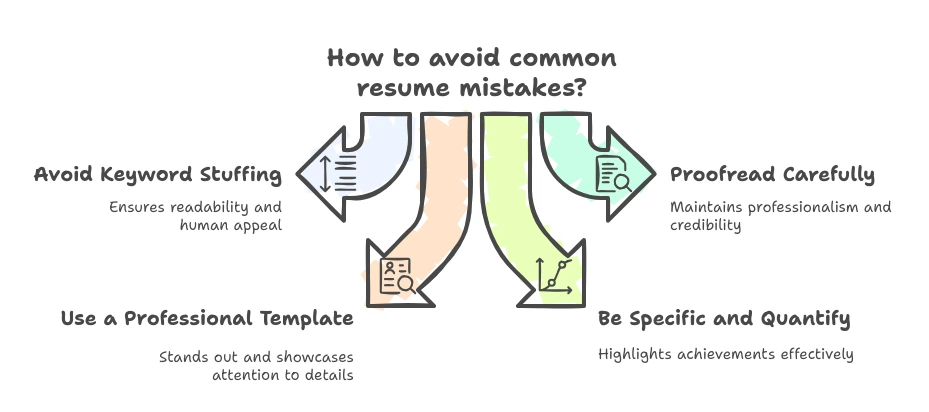
Putting It All Together: A Targeted Resume Example
Here is an example of a targeted resume for a fictional "Digital Marketing Specialist" position. The job description for this role emphasizes SEO, social media marketing, and content creation.
Jane Doe (123) 456-7890 | [email protected] | linkedin.com/in/janedoe
Professional Summary
A results-driven Digital Marketing Specialist with 5+ years of experience creating and implementing successful SEO and social media strategies. Proven ability to increase website traffic, engagement, and conversions. Seeking to leverage my expertise in content creation and data analysis to contribute to the success of XYZ Company.
Skills
- SEO: Keyword Research, On-Page SEO, Link Building, Google Analytics
- Social Media Marketing: Content Creation, Community Management, Social Media Advertising (Facebook, Instagram, Twitter)
- Content Creation: Blogging, Copywriting, Video Editing
- Tools: HubSpot, Mailchimp, Canva, WordPress
Work Experience
Digital Marketing Specialist | ABC Company | Anytown, USA | 2020 - Present
- Developed and executed a comprehensive SEO strategy that resulted in a 150% increase in organic traffic and a 50% increase in keyword rankings in the first year.
- Managed all social media channels, growing the company's following by 75% and increasing engagement by 40%.
- Created and managed a content calendar, producing 4-5 blog posts per week and a monthly newsletter with a 25% open rate.
Marketing Coordinator | 123 Company | Sometown, USA | 2018 - 2020
- Assisted in the development and execution of marketing campaigns.
- Wrote and edited copy for marketing materials, including brochures, emails, and social media posts.
- Conducted market research and analysis to identify trends and opportunities.
Education
Bachelor of Science in Marketing | University of Example | Exampletown, USA | 2014 - 2018
- Relevant Coursework: Digital Marketing, Social Media Marketing, SEO, Content Marketing
- Dean's List: 2016, 2017, 2018
The Fastest Way to Create a Targeted Resume
Creating a targeted resume for every job application can be a time-consuming and tedious process. But what if you could do it in a fraction of the time, with better results? That's where Reztune comes in.
Reztune is an AI-powered resume builder that takes the guesswork out of resume tailoring. Simply upload your resume and the job description, and Reztune will automatically rewrite and format your resume to match the specific requirements of the role. It analyzes the job posting for keywords, skills, and industry-specific language, and then contextually integrates them into your resume, highlighting your most relevant experience. Learn more about how it works.
Ready to create a job-winning targeted resume in minutes? Try Reztune's AI-powered resume builder for free and let your resume write itself.
Frequently Asked Questions (FAQ)
Have more questions? See more frequently asked questions.
How long should a targeted resume be?
Ideally, a targeted resume should be one page long. However, if you have extensive experience that is relevant to the job, a two-page resume is acceptable. The key is to keep it concise and focused on the most important information.
Should I have a master resume?
Yes, it's a good idea to have a master resume that includes all of your work experience, skills, and accomplishments. This will make it easier to create a targeted resume for each job application, as you can simply copy and paste the most relevant information from your master resume.
Can I use a targeted resume for a career change?
A tailored resume is essential for a career change. It allows you to highlight your transferable skills and show how your past experience is relevant to the new role you are seeking. You may also want to include a resume summary that explains your career change and your motivation for entering the new field.
How can I show I'm a good fit for the company culture in my resume?
To show you're a good fit for the company culture, research the company's values and mission. Then, in your resume, use language that reflects those values. For example, if the company values collaboration, you can highlight your experience working in teams. You can also mention any volunteer work that aligns with the company's values.
Should I include volunteer work on my resume?
Yes, you should include volunteer work on your resume, especially if it's relevant to the job you're applying for or if it demonstrates skills that are transferable to the role. Volunteer work can be a great way to fill in gaps in your work history and show your commitment to causes you care about.
How do I make my resume more actionable?
To make your resume more actionable, use strong action verbs to describe your accomplishments. Instead of using passive language like "responsible for," use active language like "managed," "created," or "led." This will make your resume more dynamic and engaging for the reader.
Conclusion
In a competitive job market, a generic resume is simply not enough. To stand out from the crowd and land the interview, you need to create a targeted resume that is tailored to each specific job application. By customizing your professional summary, skills section, work experience, and other key sections of your resume, you can create a powerful document that showcases your most relevant qualifications and proves that you are the best candidate for the job. For even more help, check out our free AI resume rewriter.
Ready to take your resume to the next level? Try Reztune today and see the difference a targeted resume can make.

